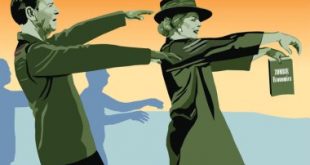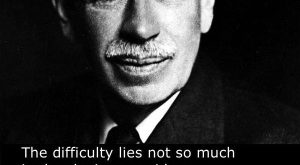[embedded content] Advertisements
Read More »Where modern macroeconomics went wrong
Where modern macroeconomics went wrong In issue 1-2 (2018) of Oxford Review of Economic Policy, the editors have invited some well-known contemporary mainstream macroeconomists (including e.g. Simon Wren-Lewis, Randall Wright, Olivier Blanchard, Ricardo Reis, Joseph Stiglitz) to give their views on how to rebuild macroeconomic theory for the future. Some of the contributions are interesting to read. Others — like Wren-Lewis and Blanchard — seem to think...
Read More »Bourdieu on neoliberalism
Economists may not necessarily share the economic and social interests of the true believers and may have a variety of individual psychic states regarding the economic and social effects of the utopia which they cloak with mathematical reason. Nevertheless, they have enough specific interests in the field of economic science to contribute decisively to the production and reproduction of belief in the neoliberal utopia. Separated from the realities of the economic and social...
Read More »Erdoğan hat die Demokratie endgültig abgeschafft
Erdoğan hat die Demokratie endgültig abgeschafft Am Sonntagabend sah ich Monteverdis Die Krönung der Poppea in der Berliner Staatsoper, eine mythische Geschichte aus dem Intrigenpalast von Kaiser Nero. Bei der Krönungsszene am Ende liegt die Hälfte der Helden in ihrem Blut am Boden. Anschließend ging ich zum Bebelplatz, wo die Nazis 1933 Bücher ins Feuer geworfen haben. Ich versuchte, mir diese Nacht der Bücherverbrennung vor 85 Jahren zu vergegenwärtigen...
Read More »Healing my soul
[embedded content] Advertisements
Read More »Mainstream economics and neoliberalism — what is the difference?
Mainstream economics and neoliberalism — what is the difference? Oxford professor Simon Wren-Lewis had a post up some time ago commenting on traction gaining ‘attacks on mainstream economics’: One frequent accusation … often repeated by heterodox economists, is that mainstream economics and neoliberal ideas are inextricably linked. Of course economics is used to support neoliberalism. Yet I find mainstream economics full of ideas and analysis that permits a...
Read More »The present state of economics
The present state of economics More and more often, confidence in the professional qualifications of individuals representing certain occupational groups which formerly were held in high esteem has started to erode. Dismissing scientific evidence and ignoring expert opinion has become a feature of political discourse around alternative truth. In part this is self-inflicted as various statements that are publicized with the aura of academic certainty do not...
Read More »Si dolce è il tormento
Si dolce è il tormento [embedded content] Advertisements
Read More »Free Zehra Dogan
Advertisements
Read More »What’s the use of economics?
What’s the use of economics? The simple question that was raised during a recent conference … was to what extent has – or should – the teaching of economics be modified in the light of the current economic crisis? The simple answer is that the economics profession is unlikely to change. Why would economists be willing to give up much of their human capital, painstakingly nurtured for over two centuries? For macroeconomists in particular, the reaction has...
Read More » Lars P. Syll
Lars P. Syll







